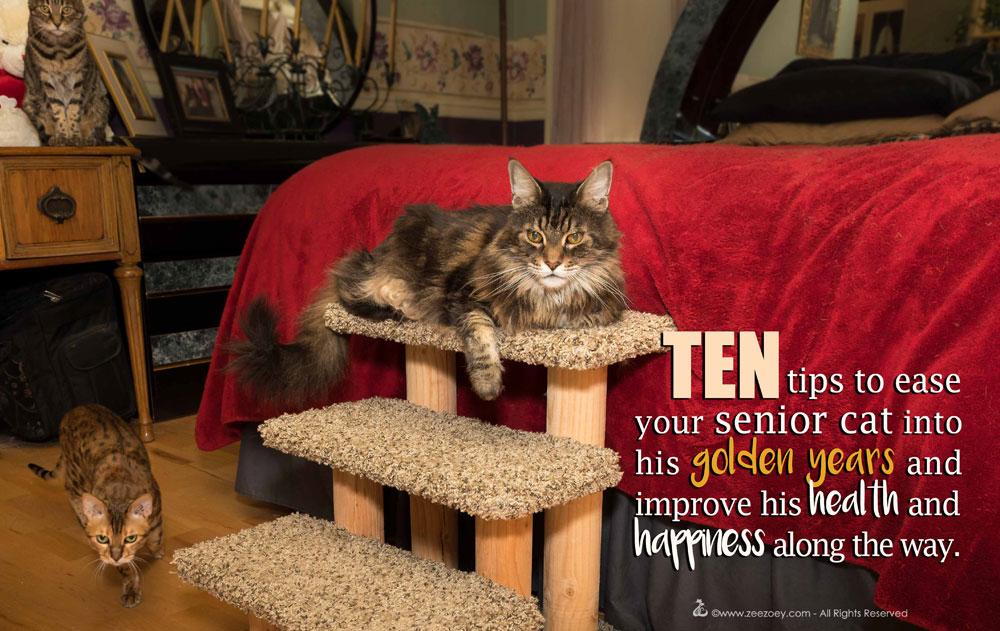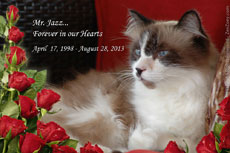Stairs, Safety, and Senior Cats – 10 Tips to Help Ease Your Cat Into His Golden Years
Update – we are very honored to report this article was the winning recipient of the Cat Writer’s Association 2018 Senior Well-Being Cat Award. as judged by Briony Scott, pet-sitting entrepreneur and certified cat behaviorist.
Dan used to lament that Zee, our brown tabby Maine Coon I got for him as a kitten as a housewarming gift when he moved in with me in 2005, did not grow into the cuddly lap cat he was hoping for. But Zee was perpetually busy. It began with him instigating rabbit-kick fighting with our adult Ragdoll cat, Jazz, (twice his size), and when we renovated our house a few months after Dan moved in, he was curiously involved in every aspect of it, as the tell-tale paint on his tail and spackle on his ears would reveal. Cuddling? Who had time for that?
Growing into adulthood he remained active, even being the cause of several calamities – a broken bottle of bright-pink grenadine knocked to the floor comes to mind – and he also had his nightly habit of bringing stuffed toys into our bedroom and lying them at the foot of our bed as gifts. I always told Dan, “Give it time, he’ll come around.”

We woke up one morning to find Zee had left these gifts for us at the foot of our bed. Even to this day, the habit continues.
At 13 years old, Zee is that lap cat now. When it happened, I really don’t know. It’s the trickery of time in which his life has snuck by me, creeping up to the realization my beautiful boy, but a kitten in my mind just yesterday, is now a senior cat.
His fur, once thick and glossy has lost some of its luster, and eyes, once shining so bright, are now slightly clouded. He still fights with the other cats, but not with the same energy, and toys also make it into our bedroom, but not with the same militant regularity.

At 13 years old, Zee prefers to spend most of his day napping rather than engaging in high-energy activities.
He’s also lost the spring in his step, finding it difficult to jump up onto our bed, something he’s been doing easily for years. Much as I want to bury my head in the sand and pretend it isn’t happening, I can’t ignore the fact he is getting older. The kindest gesture of love I can give him is to adjust for the changing stages of his life and first on my list was to purchase him step stairs to put at the end of our bed. This has already improved his quality of life and it makes my heart smile to see how quickly he adapted to them.
According to International Cat Care feline ages and life stages have been redefined. Cats are elderly once they reach 11 years with senior cats defined as those aged between 11 – 14 and geriatric cats 15 years and upwards. Due to improved nutrition, living indoors, and advances in veterinary medicine, it’s not unusual for veterinarians to have feline patients in their twenties.
To help ease your cat into his golden years here are 10 tips to improve his comfort, health, and well-being:

These 3-tiered steps have made a significant difference in Zee’s life to help him navigate getting up and down the bed on his own.
1. Schedule regular veterinary exams for your senior cat in six-month intervals and develop a close relationship with your veterinarian while your cat is still healthy. This will get them to know your cat to help them detect subtle changes that may indicate a health condition or disease.
2. Reduce the stress of veterinary visits by bringing the carrier out several days prior to the visit so your cat can become accustomed to it. If he climbs into it, reward him with treats and put soft, familiar bedding into the carrier so he is comforted by the scent when traveling to the vet.
3. Provide him with plenty of warm places to rest and make sure his favorite napping place is not in a drafty area of the home. There are also self-warming cat mats and heated beds for cats available and if his favorite place is up high, help him get there by creating box steps, and ramps, or purchase pet stairs that allow him to safely reach that spot on his own.

Zee is still able to jump up to the couch without too much difficulty and we always keep a blanket for him to snuggle into.
4. Older cats are more prone to arthritis and may have reduced control over their bowels and bladder so it’s important to have easily accessible litter boxes on every floor of the home. If it’s difficult for your cat to climb into the litter box, use one with low sides, or put pee pads or newspaper on the floor around the litter box if he can’t quite make it. If he begins to have accidents around the house, there may be a medical issue, such as a urinary infection, constipation, arthritis, or muscle weakness and you should bring him to your veterinarian for an exam.
5. Provide easy access to food and water, putting bowls in more than one area of the house if necessary, especially in a home with stairs your cat might not be able to climb. Feed your cat in an elevated bowl as well – this will alleviate your cat having to uncomfortably bend down to eat and will aid with digestion. And be mindful that fresh water and nutritious food are vital to cats of any age but may be particularly important for older cats. Your veterinarian can offer advice on choosing a diet that provides appropriate nutrition and the right amount of calories for your aging cat. If you notice either unexpected weight gain or loss, the American Association of Feline Practitioners indicates this also requires a visit to the veterinarian, as it’s typically a sign in senior cats something is wrong.

Conveniently located food dishes are important for a senior cat. as well as having them raised off the floor to aid in digestion and body mobility.
6. Help to gently groom your cat if his self-grooming habits begin to wane, especially for long-haired cats who may become uncomfortably matted. Gently brushing or combing removes loose hairs and stimulates circulation and sebaceous gland secretions, returning luster to the coat. Being hands-on with your cat also enhances your bond and allows you familiarity with his body. If you notice any unusual lumps, bumps, or anything else, your veterinarian should be notified.
7. Cats have great night vision, but as they age problems might develop, making it difficult for them to navigate around. Keep a nightlight on and if your cat is blind, keep his environment as stationary and consistent as possible. A cat’s hearing can also deteriorate, so approach your cat from the front rather than behind to avoid startling him.
8. Keep your senior cat youthful with gentle play sessions, such as waving a wand toy or encouraging him to follow you around for exercise. And if you’re thinking of bringing a kitten into the equation to energize your senior cat, according to Emily Levine, DVM, animal behavior resident of the Animal Behavior Clinic at Cornell University College of Veterinary Medicine, “a rambunctious kitten climbing all over your senior cat may be more detrimental than helpful, especially as people have a tendency to focus on the cute kitten, rather than the older cat.”

A toy like this turbo ring from Bergen Pets is ideal for a senior cat – it has a self-contained ball he can swat at and also has a scratching pad in the center to aid in nail grooming.
9. Respect that your senior cat appreciates predictability and it may be harder for him to deal with changes. Some may need more emotional support as they age, and others may prefer to be left alone. It’s important to pay attention to these habits because cats are masters at hiding illness and the signs are often subtle and easily missed. If you notice a difference in behavior, don’t ignore it – let your veterinarian know.
10. Rather than lament your cat is getting older, take the time to really enjoy your moments together. Extra hugs, pets, loving words, and shared cuddle time will all help to let your senior know just how loved he is and enhance your feline-human bond.
It’s not always easy, but with Zee, I try not to dwell on the inevitable that our shared time is but borrowed and brief. I instead cherish every moment we have. Every time I scoop his litter, feed him a meal, brush his fur, hold him in my lap, or feel his warm body on top of my head when I go to bed at night is a gift.

























We’ve just head-butted this issue over the weekend, when I brought 14 year-old Angel to the vet due to increased urination. Her blood tests came back perfect, and no bladder infection, or diabetes, or kidney changes. She has gotten a bit crankier, and now that the cool weather is here, it’s time to find her a heated bed, and some steps make sense too.
dood…..check inta self warmin matts….we duuno what sliced bread iz, but they
is de greatest thing sinz that sliced bread thing happened ! 🙂
now….if we could all get sum social secatity chex ~~~~~~~ 🙂 ♥♥
Awww, Zee! Since my three range in age from 11-15, I am very aware of these matters and cherish every moment with my beloved ones. Eastside Cats and da tabbies of trout towne have some excellent suggestions, too — we have one of those self-warming bed mats, and though it isn’t getting a lot of use these days as they prefer my lap or the bed, it has given a lot of pleasure in the past! We also love the purr pads, which are soft and cozy and can be replaced when needed, as they are very affordable. These come in pairs, too! and are available in either white or a very nice dark grey.
Long may our beloved mature cats live, and PAWS-PURR!
Oh Deb…this is purrfectly timed. Abby just turned 13 AND we’ve brought a youngster into her world. She seems to have handled it rather well….but I still worry about her comfort level with him.
We’ve made the adjustments for her being able to reach the bed and Mark’s file cabinet. I’m just not sure how we can make sure she’s ok with her new little brother.
Love and Hugs to Zee and the rest of the gang! xoxo
Thanks for sharing this wonderful post. Our cat will be 13 early next year. As of right now she is very active and always running around like her earlier years. These are some great tips that we are going to use. Great to see Zee in the photos. So beautiful. Have a wonderful day.
Lexy is 10, and I can’t believe the years have flown by so fast. I hope she stays as active as she is now for a very long time! The thought of her slowing down scares me so much. These are great tips to remember.
Where do the years go Deb? This is such a poignant post for me, as I so clearly remember Zee as a kitten – and Tsunami is just a few years behind him (11 – how can this be!)
I love the tips you’ve provided – those steps are going on our list for Tsunami – we already have chairs and jumping aids around to help him get to the places he needs!
By the way, the turbo ring is Tsunami’s favorite toy! I have to get him a new one though – Magellan stole his ball from the last one!
Beautiful post, and great tips. It reminds Claire of the times when Angel Hercule became a senior cat. Purrs
My “kittens” are now 10 years old but I can’t believe it. Luckily they still play like kittens. But I’m more worried about my older cats, especially Jabberwoky Glitter who is suffering from a number of illnesses. She is holding her own though so I just keep a close eye on her and make her as happy and comfortable as I can.
Thanks for the great article!